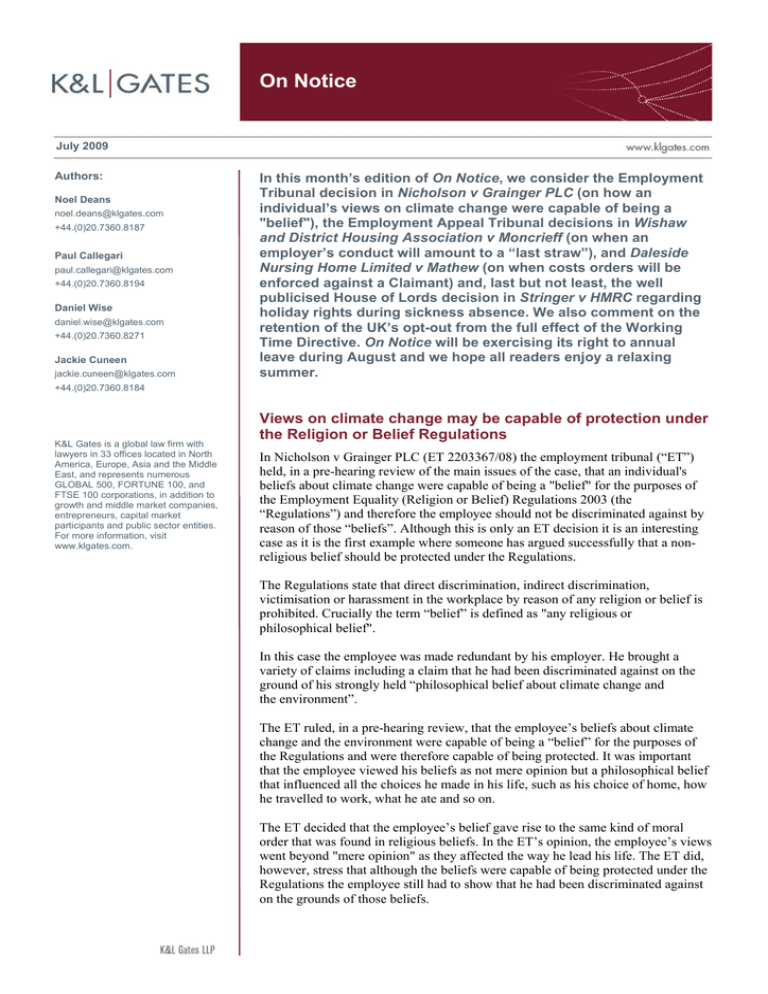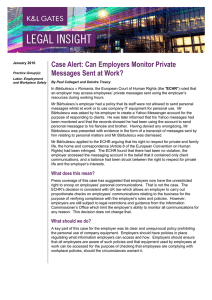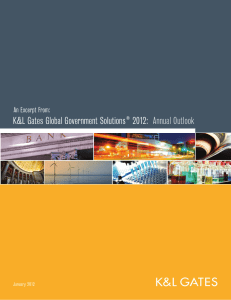On Notice
advertisement

On Notice July 2009 Authors: Noel Deans noel.deans@klgates.com +44.(0)20.7360.8187 Paul Callegari paul.callegari@klgates.com +44.(0)20.7360.8194 Daniel Wise daniel.wise@klgates.com +44.(0)20.7360.8271 Jackie Cuneen jackie.cuneen@klgates.com In this month’s edition of On Notice, we consider the Employment Tribunal decision in Nicholson v Grainger PLC (on how an individual’s views on climate change were capable of being a "belief"), the Employment Appeal Tribunal decisions in Wishaw and District Housing Association v Moncrieff (on when an employer’s conduct will amount to a “last straw”), and Daleside Nursing Home Limited v Mathew (on when costs orders will be enforced against a Claimant) and, last but not least, the well publicised House of Lords decision in Stringer v HMRC regarding holiday rights during sickness absence. We also comment on the retention of the UK’s opt-out from the full effect of the Working Time Directive. On Notice will be exercising its right to annual leave during August and we hope all readers enjoy a relaxing summer. +44.(0)20.7360.8184 K&L Gates is a global law firm with lawyers in 33 offices located in North America, Europe, Asia and the Middle East, and represents numerous GLOBAL 500, FORTUNE 100, and FTSE 100 corporations, in addition to growth and middle market companies, entrepreneurs, capital market participants and public sector entities. For more information, visit www.klgates.com. Views on climate change may be capable of protection under the Religion or Belief Regulations In Nicholson v Grainger PLC (ET 2203367/08) the employment tribunal (“ET”) held, in a pre-hearing review of the main issues of the case, that an individual's beliefs about climate change were capable of being a "belief" for the purposes of the Employment Equality (Religion or Belief) Regulations 2003 (the “Regulations”) and therefore the employee should not be discriminated against by reason of those “beliefs”. Although this is only an ET decision it is an interesting case as it is the first example where someone has argued successfully that a nonreligious belief should be protected under the Regulations. The Regulations state that direct discrimination, indirect discrimination, victimisation or harassment in the workplace by reason of any religion or belief is prohibited. Crucially the term “belief” is defined as "any religious or philosophical belief". In this case the employee was made redundant by his employer. He brought a variety of claims including a claim that he had been discriminated against on the ground of his strongly held “philosophical belief about climate change and the environment”. The ET ruled, in a pre-hearing review, that the employee’s beliefs about climate change and the environment were capable of being a “belief” for the purposes of the Regulations and were therefore capable of being protected. It was important that the employee viewed his beliefs as not mere opinion but a philosophical belief that influenced all the choices he made in his life, such as his choice of home, how he travelled to work, what he ate and so on. The ET decided that the employee’s belief gave rise to the same kind of moral order that was found in religious beliefs. In the ET’s opinion, the employee’s views went beyond "mere opinion" as they affected the way he lead his life. The ET did, however, stress that although the beliefs were capable of being protected under the Regulations the employee still had to show that he had been discriminated against on the grounds of those beliefs. On Notice The employer has confirmed that it will be appealing the pre-hearing review and it will be interesting to see what the Employment Appeal Tribunal (“EAT”) decides. If the EAT agrees with the ET’s findings it could open the floodgates for discrimination claims against employers relating to all kinds of beliefs. It is also interesting that in the Explanatory Notes to the draft Equality Bill, released earlier this year, in relation to the protected characteristic of “Religion or Belief” the Government specifically states that “political beliefs and beliefs in scientific theories are not religious or philosophical beliefs”. This is very similar to the argument raised by the employer at the prehearing review and is also very similar to the initial guidance given in the BIS Explanatory Guide on the Regulations. Any appeal decision will, of course, be reported in On Notice. had previously been offered external mediation. He resigned in January 2007 and brought a claim for constructive unfair dismissal contending that his grievance had not been fairly investigated and that he had been intimidated and harassed by his employer. . His claim succeeded before the ET. The employer appealed to the EAT on the basis that the ET had not identified any conduct by the employer that could amount to a “last straw”. The appeal succeeded. The EAT decided that an ET must: • first, identify the “last straw” act; • secondly, consider whether objectively that act is capable of contributing to a series of earlier acts so as to amount cumulatively to a breach of the implied term of trust and confidence by the employer; and • thirdly, if it does, consider the other acts in the series of acts and whether looked at together they amount to a breach of the implied term. For more information on this case please contact Paul Callegari. EAT decision on when employer’s conduct is a “last straw” for constructive unfair dismissal In Wishaw and District Housing Association v Moncrieff (UKEATS/0066/08/B1) the EAT has given useful guidance on what kind of conduct can constitute a “last straw” in a constructive unfair dismissal case. An employee can resign and claim constructive dismissal if there is a fundamental breach of his or her contract of employment by the employer (most commonly an employee cites a breach of the implied term of trust and confidence). This fundamental breach can be caused by the cumulative effect of a series of actions, culminating in an act alleged to be the “last straw”. In this case, the employee (who worked as a property inspector) was called to a meeting by his employer in May 2006 where 13 areas of concern about his performance where identified. He then went on sick leave with depression and never returned to work. He had also suffered personal difficulties in the previous year. There was a great deal of correspondence between the employee and the employer. The employer was also sceptical about the validity of his sickness absence. In late 2006 the employee received 2 letters from his employer. One threatened that the employer might consider his possible dismissal because of his long term absence. The other offered to deal internally with a grievance he had raised when he The test is objective. In this case, the ET had failed to clearly identify which act was the “last straw”. Moreover, there was no evidence of any act which could amount to a “last straw”. The letters sent in late 2006 were the only possible candidates. Viewed objectively, neither was objectionable. The EAT thought that the letter threatening to consider possible dismissal was perfectly legitimate (the letter did not present dismissal as a fait accompli). Similarly, the letter suggesting dealing with the grievance internally was merely a proposal and could not be considered to amount to a “last straw”. The decision provides useful guidance in this area and clarifies that not all conduct is capable of amounting to a “last straw”. Employers should not feel hindered from taking even robust steps in the course of a dispute, provided they are justifiable, for fear that this will trigger a constructive unfair dismissal claim. For more information on this case please contact Noel Deans. July 2009 2 On Notice Costs order enforced against a claimant acting unreasonably in bringing the claim Daleside Nursing Home Limited v Mathew (UKEAT/0519/08) is a decision of the EAT which will be welcomed by employers. It relates to the question of whether the ET should make a costs order against an employee who is found to have lied. (www.practicallaw.com/resource.do?item=:5566 7623) In this case the ET decided that the allegation at the heart of the employee's claim for direct race discrimination, that she had been subjected to explicit and offensive racial abuse (being called a "black bitch" by her manager), had not occurred. Even though the ET found that the “allegation of explicit and offensive racial abuse” was false, it refused to order the employee to pay costs as “she did have a genuine belief that the claim had some merit”. The EAT overturned this decision. It noted that the ET’s rejection of the claim had necessarily involved a finding that the employee's case involved "a deliberate and, to an extent cynical, lie". In the EAT's view, where there is a "clearcut finding that the central allegation ... was a lie, it is perverse for the ET to fail to conclude that the making of such a false allegation at the heart of the claim does not constitute a person acting unreasonably". If an ET’s decision is “perverse” it means that it can be overturned by the EAT, so here the EAT referred the matter back to the ET with an instruction to make a costs order against the employee. According to the EAT report, the costs may be as much as £20,000. This case provides some good news for employers in that it should make employees think twice before making wholly fictitious and unreasonable claims against them. For more information on this case please contact Daniel Wise. House of Lords decision in Stringer v HMRC In February’s On Notice we summarised the important ECJ decision in Stringer v HMRC which decided that a worker does not lose the right to paid annual leave which has not been taken due to sickness. In summary, the ECJ concluded: • That a worker is entitled to his annual statutory holiday entitlement if prevented from taking it during the last year because he is on sick leave. • The right to paid annual leave is not extinguished at the end of a leave year if the worker was on sick leave for the whole of that year, or if he was absent on sick leave for part of the year and was still on sickleave when his employment terminated. • It is up to the national courts to decide whether paid leave can be taken during a period of sick leave, or whether it should be carried over to another year. Many had hoped that the House of Lords' decision would give answers to the difficult issues which have arisen about the accrual and payment of annual leave during sick leave and whether it is carried over to subsequent years in long term ill health cases. HMRC, however, declined to pursue a number of its main arguments in the light of the ECJ decision and so the House of Lords did not make a decision on the difficult question of when this leave can be taken or whether the leave can be carried forward to the next year (something which is prohibited by the Working Time Regulations 1998). There is still some ambiguity about whether workers on sick leave are allowed to carry over their holiday or whether they can take it whilst off sick. Employers will, therefore, still face difficult questions from employees on these issues and employers should think carefully about new policies adopted in this area to ensure the commercial needs of the business are best served. Some commentators have argued that these issues are limited to "only" the European minimum annual leave (4 weeks) rather than the “new” minimum under the Working Time Regulations (now 5.6 weeks). Until there have been further decisions on this issue it is unclear what the correct position is. There are also potential headaches for employers with PHI schemes. An employee may be on PHI for years and then come back to work. This employee will now accrue large amounts of holiday which he or she may be entitled to upon their return to work. The PHI insurers are unlikely to cover these additional payments and they may be costly to employers. July 2009 3 On Notice The financial implications for employers of the decision are clear, notwithstanding the uncertainty about the technicalities. Significant claims for holiday pay and leave are now likely to accrue while employees are off sick. This will lead to additional costs for employers, as workers on long-term sick leave who have used up their sick pay entitlement will be entitled to be paid in respect of their statutory holiday entitlement. Working Time Directive opt-out retained for time being There is further bad news for employers. The House of Lords has held that a claim for unpaid holiday under the Working Time Regulations (or a payment in lieu on termination) can be pursued as an unauthorised deduction from wages claim under the Employment Rights Act 1996 as well as under the Working Time Regulations. This means that employees can take advantage of the more generous time limits which apply and potentially a claim which goes back many months can be pursued if the underpayments form part of a series of deductions from salary. The important point for employers is that the countries involved will retain, at least for the time being, the right for individuals to opt out of the maximum 48-hour working week laid down by the Working Time Directive legislation. The UK was the first Member State to secure an optout (14 other Member States have since acquired similar opt-outs for certain sectors). Any further developments will be reported in On Notice. In an important development, negotiations between a number of European governments (including the UK) and MEPs over changes to the rules governing the 48 hour working week broke down over the course of April and May this year. For more information on this please contact Paul Callegari. For more information on this case please contact Jackie Cuneen. Anchorage Austin Beijing Berlin Boston Charlotte Chicago Dallas Dubai Fort Worth Frankfurt Harrisburg Hong Kong London Los Angeles Miami Newark New York Orange County Palo Alto Paris Pittsburgh Portland Raleigh Research Triangle Park San Diego San Francisco Seattle Shanghai Singapore Spokane/Coeur d’Alene Taipei Washington, D.C. K&L Gates is a global law firm with lawyers in 33 offices located in North America, Europe, Asia and the Middle East, and represents numerous GLOBAL 500, FORTUNE 100, and FTSE 100 corporations, in addition to growth and middle market companies, entrepreneurs, capital market participants and public sector entities. For more information, visit www.klgates.com. K&L Gates comprises multiple affiliated partnerships: a limited liability partnership with the full name K&L Gates LLP qualified in Delaware and maintaining offices throughout the U.S., in Berlin and Frankfurt, Germany, in Beijing (K&L Gates LLP Beijing Representative Office), in Dubai, U.A.E., in Shanghai (K&L Gates LLP Shanghai Representative Office), and in Singapore (K&L Gates LLP Singapore Representative Office); a limited liability partnership (also named K&L Gates LLP) incorporated in England and maintaining offices in London and Paris; a Taiwan general partnership (K&L Gates) maintaining an office in Taipei; and a Hong Kong general partnership (K&L Gates, Solicitors) maintaining an office in Hong Kong. K&L Gates maintains appropriate registrations in the jurisdictions in which its offices are located. A list of the partners in each entity is available for inspection at any K&L Gates office. This publication is for informational purposes and does not contain or convey legal advice. The information herein should not be used or relied upon in regard to any particular facts or circumstances without first consulting a lawyer. ©2009 K&L Gates LLP. All Rights Reserved. July 2009 4






